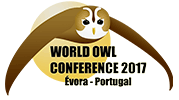SCIENTIFIC & EDITORIAL COMMITTEES
Scientific committee
David H. Johnson
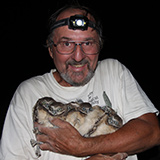 During the last 40 years, David H. Johnson has been focused at senior scientific, legal, and professional management applications in the fields of wildlife, freshwater fish, wildlife and fish habitat, forestry, marine ecology, and civil engineering. But his passion has always been for owls. His research on owls began in 1976, with a key role in Spotted Owl conservation efforts in nw US from 1993-1996. In 2001, David started the Global Owl Project, a consortium of about 450 people working on the science and conservation of owls in 66 countries.
During the last 40 years, David H. Johnson has been focused at senior scientific, legal, and professional management applications in the fields of wildlife, freshwater fish, wildlife and fish habitat, forestry, marine ecology, and civil engineering. But his passion has always been for owls. His research on owls began in 1976, with a key role in Spotted Owl conservation efforts in nw US from 1993-1996. In 2001, David started the Global Owl Project, a consortium of about 450 people working on the science and conservation of owls in 66 countries.
James Duncan
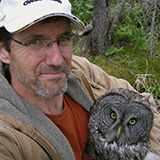 James Duncan, born in Montréal, Québec, obtained a B.Sc. (1982 – Honours Zoology – U. of Guelph), a B.Ed. (1983 – Biology/Chemistry – Queen’s U.), a M.Sc. (1985 – Zoology – McGill U.) and a Ph.D. (1992 – Zoology – U. of Manitoba). He has worked since 1992 in conservation biology and is now Director, Manitoba Wildlife and Fisheries Branch. James has researched owls for over 35 years and has published numerous scientific papers, books and symposium proceedings on owls from around the world. He also supervises graduate students studying owls and other birds of prey as adjunct professor at two universities.
James Duncan, born in Montréal, Québec, obtained a B.Sc. (1982 – Honours Zoology – U. of Guelph), a B.Ed. (1983 – Biology/Chemistry – Queen’s U.), a M.Sc. (1985 – Zoology – McGill U.) and a Ph.D. (1992 – Zoology – U. of Manitoba). He has worked since 1992 in conservation biology and is now Director, Manitoba Wildlife and Fisheries Branch. James has researched owls for over 35 years and has published numerous scientific papers, books and symposium proceedings on owls from around the world. He also supervises graduate students studying owls and other birds of prey as adjunct professor at two universities.
Dries Van Nieuwenhuyse
 Dries Van Nieuwenhuyse is thought leader on the impact of technology and statistics on the decision-making processes of organizations in the Benelux. He is involved as a coach to executives to optimize decision-making and its underlying processes in organizations. Dries lectures on Performance Management, Business and Analytical Intelligence at EHSAL Management School (Odisee), Thomas More (Mechelen). He is also programme director for Corporate Performance Management at the EHSAL Management School (Odisee). He is Fellow of the Hogenheuvelcollege (Katholieke Universiteit Leuven) and is researcher at the Thomas More Business Intelligence Competency Center. Dries studies and publishes on Little Owls (Athene noctua) and Red-backed Shrikes (Lanius collurio). He co-authored the Little Owl monography (Cambridge University Press) and several books on Little Owls and shrikes in Dutch.
Dries Van Nieuwenhuyse is thought leader on the impact of technology and statistics on the decision-making processes of organizations in the Benelux. He is involved as a coach to executives to optimize decision-making and its underlying processes in organizations. Dries lectures on Performance Management, Business and Analytical Intelligence at EHSAL Management School (Odisee), Thomas More (Mechelen). He is also programme director for Corporate Performance Management at the EHSAL Management School (Odisee). He is Fellow of the Hogenheuvelcollege (Katholieke Universiteit Leuven) and is researcher at the Thomas More Business Intelligence Competency Center. Dries studies and publishes on Little Owls (Athene noctua) and Red-backed Shrikes (Lanius collurio). He co-authored the Little Owl monography (Cambridge University Press) and several books on Little Owls and shrikes in Dutch.
Ricardo Tomé
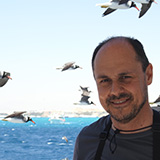 I am an ornithologist and ecology expert with a huge passion by owls, which lead me to develop a Ph.D. on the ecology of Barn and Little Owls in Mediterranean habitats. Nowadays I work at the company STRIX, mostly on environmental monitoring and impact assessment. Most of the projects I am involved aim to assess and reduce impacts of wind farms on birds and on migratory corridors for birds, by using radar detection and temporary turbine shutdown. I have been actively engaged in bird conservation through collaborations with BirdLife International, both in Portugal and abroad. Owls are still my major passion and I also co-coordinate the Nocturnal Birds Work Group (GTAN-SPEA) in Portugal.
I am an ornithologist and ecology expert with a huge passion by owls, which lead me to develop a Ph.D. on the ecology of Barn and Little Owls in Mediterranean habitats. Nowadays I work at the company STRIX, mostly on environmental monitoring and impact assessment. Most of the projects I am involved aim to assess and reduce impacts of wind farms on birds and on migratory corridors for birds, by using radar detection and temporary turbine shutdown. I have been actively engaged in bird conservation through collaborations with BirdLife International, both in Portugal and abroad. Owls are still my major passion and I also co-coordinate the Nocturnal Birds Work Group (GTAN-SPEA) in Portugal.
Rui Lourenço
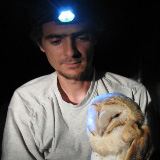 Born in 1977 in Lisbon, Portugal. My degree dissertation in zoology (Univ. Lisbon, 2000) was on eagle owls. My MSc degree thesis in conservation biology (Univ. Évora, 2005) was focused on eagle owl diet. My PhD thesis in biology (UÉvora, 2011) was focused on the competitive and predatory interactions of eagle owls with other raptors. My main research subject has always been owls, studying aspects like diet, distribution, interactions, road ecology, and ecotoxicology. Besides research, I’ve worked in conservation and education in NGO’s. Currently, I’m a post-doctoral researcher at the LabOr, University of Évora, also coordinating the program Noctua-Portugal (GTAN-SPEA).
Born in 1977 in Lisbon, Portugal. My degree dissertation in zoology (Univ. Lisbon, 2000) was on eagle owls. My MSc degree thesis in conservation biology (Univ. Évora, 2005) was focused on eagle owl diet. My PhD thesis in biology (UÉvora, 2011) was focused on the competitive and predatory interactions of eagle owls with other raptors. My main research subject has always been owls, studying aspects like diet, distribution, interactions, road ecology, and ecotoxicology. Besides research, I’ve worked in conservation and education in NGO’s. Currently, I’m a post-doctoral researcher at the LabOr, University of Évora, also coordinating the program Noctua-Portugal (GTAN-SPEA).
Inês Roque
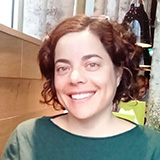 My work with owls started in 2001, with my Biology degree project on Barn Owl ecology. My masters dissertation in Conservation Biology focused on the owl community in a silvo-pastoral system and my PhD thesis in Biology focused on the Barn Owl as a biomonitor of environmental contamination. Member of LabOr, University of Évora team since 2004, I’m the executive responsible for the TytoTagus Project since 2006. I have broad interests in ecology and conservation, ecotoxicology, ethno-ornithology and transfer of scientific knowledge to society, with owls as a common line. I also co-coordinate the Nocturnal Birds Working Group (GTAN-SPEA) in Portugal.
My work with owls started in 2001, with my Biology degree project on Barn Owl ecology. My masters dissertation in Conservation Biology focused on the owl community in a silvo-pastoral system and my PhD thesis in Biology focused on the Barn Owl as a biomonitor of environmental contamination. Member of LabOr, University of Évora team since 2004, I’m the executive responsible for the TytoTagus Project since 2006. I have broad interests in ecology and conservation, ecotoxicology, ethno-ornithology and transfer of scientific knowledge to society, with owls as a common line. I also co-coordinate the Nocturnal Birds Working Group (GTAN-SPEA) in Portugal.
Editorial committee
David H. Johnson
 During the last 40 years, David H. Johnson has been focused at senior scientific, legal, and professional management applications in the fields of wildlife, freshwater fish, wildlife and fish habitat, forestry, marine ecology, and civil engineering. But his passion has always been for owls. His research on owls began in 1976, with a key role in Spotted Owl conservation efforts in nw US from 1993-1996. In 2001, David started the Global Owl Project, a consortium of about 450 people working on the science and conservation of owls in 66 countries.
During the last 40 years, David H. Johnson has been focused at senior scientific, legal, and professional management applications in the fields of wildlife, freshwater fish, wildlife and fish habitat, forestry, marine ecology, and civil engineering. But his passion has always been for owls. His research on owls began in 1976, with a key role in Spotted Owl conservation efforts in nw US from 1993-1996. In 2001, David started the Global Owl Project, a consortium of about 450 people working on the science and conservation of owls in 66 countries.
James Duncan
 James Duncan, born in Montréal, Québec, obtained a B.Sc. (1982 – Honours Zoology – U. of Guelph), a B.Ed. (1983 – Biology/Chemistry – Queen’s U.), a M.Sc. (1985 – Zoology – McGill U.) and a Ph.D. (1992 – Zoology – U. of Manitoba). He has worked since 1992 in conservation biology and is now Director, Manitoba Wildlife and Fisheries Branch. James has researched owls for over 35 years and has published numerous scientific papers, books and symposium proceedings on owls from around the world. He also supervises graduate students studying owls and other birds of prey as adjunct professor at two universities.
James Duncan, born in Montréal, Québec, obtained a B.Sc. (1982 – Honours Zoology – U. of Guelph), a B.Ed. (1983 – Biology/Chemistry – Queen’s U.), a M.Sc. (1985 – Zoology – McGill U.) and a Ph.D. (1992 – Zoology – U. of Manitoba). He has worked since 1992 in conservation biology and is now Director, Manitoba Wildlife and Fisheries Branch. James has researched owls for over 35 years and has published numerous scientific papers, books and symposium proceedings on owls from around the world. He also supervises graduate students studying owls and other birds of prey as adjunct professor at two universities.
Dries Van Nieuwenhuyse
 Dries Van Nieuwenhuyse is thought leader on the impact of technology and statistics on the decision-making processes of organizations in the Benelux. He is involved as a coach to executives to optimize decision-making and its underlying processes in organizations. Dries lectures on Performance Management, Business and Analytical Intelligence at EHSAL Management School (Odisee), Thomas More (Mechelen). He is also programme director for Corporate Performance Management at the EHSAL Management School (Odisee). He is Fellow of the Hogenheuvelcollege (Katholieke Universiteit Leuven) and is researcher at the Thomas More Business Intelligence Competency Center. Dries studies and publishes on Little Owls (Athene noctua) and Red-backed Shrikes (Lanius collurio). He co-authored the Little Owl monography (Cambridge University Press) and several books on Little Owls and shrikes in Dutch.
Dries Van Nieuwenhuyse is thought leader on the impact of technology and statistics on the decision-making processes of organizations in the Benelux. He is involved as a coach to executives to optimize decision-making and its underlying processes in organizations. Dries lectures on Performance Management, Business and Analytical Intelligence at EHSAL Management School (Odisee), Thomas More (Mechelen). He is also programme director for Corporate Performance Management at the EHSAL Management School (Odisee). He is Fellow of the Hogenheuvelcollege (Katholieke Universiteit Leuven) and is researcher at the Thomas More Business Intelligence Competency Center. Dries studies and publishes on Little Owls (Athene noctua) and Red-backed Shrikes (Lanius collurio). He co-authored the Little Owl monography (Cambridge University Press) and several books on Little Owls and shrikes in Dutch.
Inês Roque
 My work with owls started in 2001, with my Biology degree project on Barn Owl ecology. My masters dissertation in Conservation Biology focused on the owl community in a silvo-pastoral system and my PhD thesis in Biology focused on the Barn Owl as a biomonitor of environmental contamination. Member of LabOr, University of Évora team since 2004, I’m the executive responsible for the TytoTagus Project since 2006. I have broad interests in ecology and conservation, ecotoxicology, ethno-ornithology and transfer of scientific knowledge to society, with owls as a common line. I also co-coordinate the Nocturnal Birds Working Group (GTAN-SPEA) in Portugal.
My work with owls started in 2001, with my Biology degree project on Barn Owl ecology. My masters dissertation in Conservation Biology focused on the owl community in a silvo-pastoral system and my PhD thesis in Biology focused on the Barn Owl as a biomonitor of environmental contamination. Member of LabOr, University of Évora team since 2004, I’m the executive responsible for the TytoTagus Project since 2006. I have broad interests in ecology and conservation, ecotoxicology, ethno-ornithology and transfer of scientific knowledge to society, with owls as a common line. I also co-coordinate the Nocturnal Birds Working Group (GTAN-SPEA) in Portugal.
